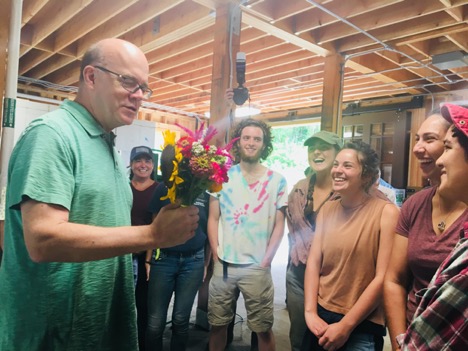Congressman Jim McGovern (D-MA) stopped by the University of Massachusetts student farm last month as part of his widespread annual farm tour to better explore the state’s agricultural industry.
Sipping coffee, student farmers mingled with USDA officials and local agriculture experts at the University’s Agricultural Learning Center as they waited for Congressman Jim McGovern to arrive.
McGovern was greeted by Chancellor Kumble Subbaswamy who sported a pinstripe suit while the student farmers presented gifts to McGovern in their work boots, overalls and head scarves.
A box of fresh produce, a tie-dyed T-shirt and a colorful bouquet of flowers were handed to the casually dressed Congressman. Bouquet in hand, he insisted that everyone introduce themselves.
“I wouldn’t last two seconds on a farm,” McGovern said.
A longtime advocate for farmers and food equality, McGovern listened to the students in admiration. Without hesitation, he discussed the need for local food production, sustainable practices and potential future policy.
“What I worry about is making sure people who decide to enter farming can make a decent living. The value of local agriculture is clear… better food, less pesticides. It’s good for our economy,” McGovern said. “But we need to make sure that we’re supporting our local farmers. If these farms are not financially viable, then we see incredible parts of land like this all of sudden be turned over to development and it’s gone.”
Amanda Brown, director of the student farm and the Agricultural Learning Center at UMass, spoke fondly of the Congressman’s visit.
“It was an amazing opportunity for our students to hear someone on a national level advocating for them. For me personally, it was humbling and a morale booster,” Brown said.
And the support McGovern displayed may have come at just the right time. In its twelfth season, the farm had recently gone through a hurdle as a truck broke down and a cooler froze a few hundred pounds of tomatoes, according to Brown.
“Things happen that force you to adapt. Those life-building skills are essential to farming,” Brown said.
Farming is not known for being easy, but for being hard work. McGovern expressed an understanding of this as he followed the student farmers through the mud and sheep on the farm.
“A lot of the resources here help us be better stewards of the environment in general and that’s all incredibly important. But we need to do a better job throughout the state of making sure the structure is in place to support these farms,” McGovern explained. “Right now, to be a farmer in Massachusetts, you have to be able to farm… you have to be a business person, an innovator constantly open to new ideas, a bookkeeper, a public relations expert… You have to be everything.”
UMass Extension Fruit Program researcher Elizabeth Garofalo attended the tour and said that she was glad to see support coming from McGovern.
“Congressman McGovern’s visit instills in growers and students a necessary confidence in our government’s ability to do its job – advocate for us. I hope visits like his encourage students to go into policy. We desperately need people in government that understand the challenges and hardships our growers face, from labor shortages to produce prices to regulatory concerns,” Garofalo said.
When McGovern asked what was in store after graduation, one student said they were sure they “didn’t want to be a farmer anymore.”
But for those students who want to make working the land a life-long pursuit, challenges like access to capital, a constantly changing landscape and college debt to income ratio begin to mount.
However, the student farm plans to continue looking toward the future by incorporating innovative agricultural practices.
“The research that goes on here, the innovative approaches to farming that help keep our land in use and productive, it’s really wonderful. It’s a great program,” McGovern said.
Most of the attendees seemed to agree that farming is something you must love in order to do.
“It’s a lifestyle,” Brown said.
And even McGovern felt that same sentiment after his discussion with the farmers and tour of the student farm.
“At the end of the day, all their labors produce something. I think that’s a wonderful feeling and that’s why all the farmers stick with it,” McGovern said.
Brown explained that this increased awareness of supporting local farms could provide opportunity to the next generation of famers by getting people involved in the cause.
“People want to be a part of the food revolution,” Brown said.
McGovern received his hand-grown, handmade gifts with a smile that reinforced the fruits of the farm crew’s early morning labor.
“I’m just really glad he liked his tie-dye,” Brown said after rehashing the semi-chaotic process of making sure the shirts were dried before the tour.
Everyone left seemingly refreshed and carrying bumper stickers that reflected their shared attitude with the words “Yes Farms, Yes Food.”
Lyndsey A. Ware can be reached at [email protected].



















